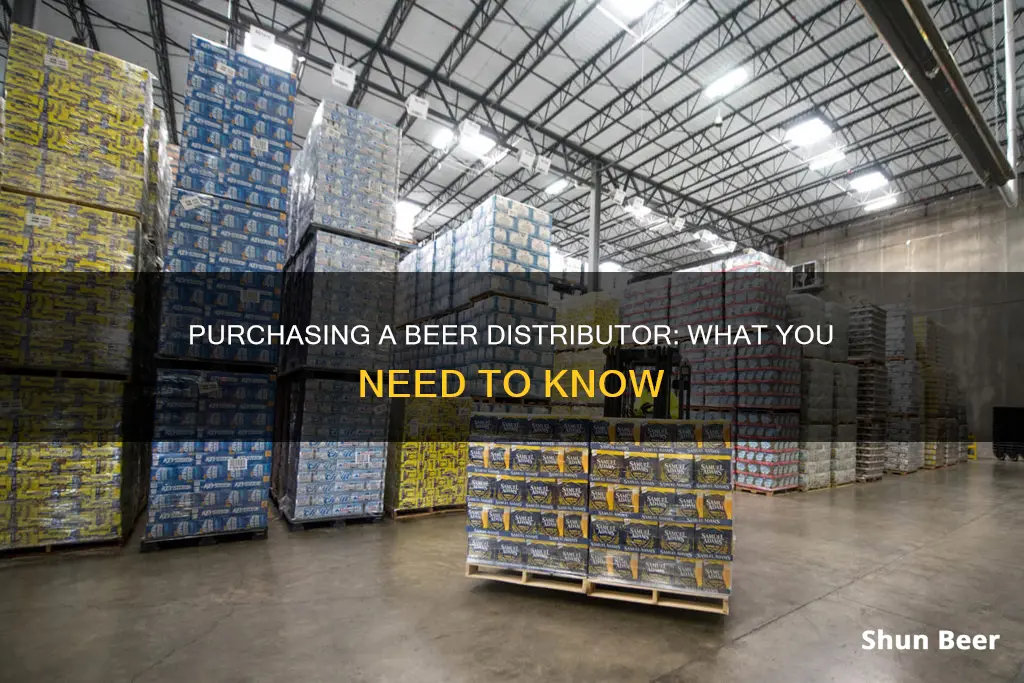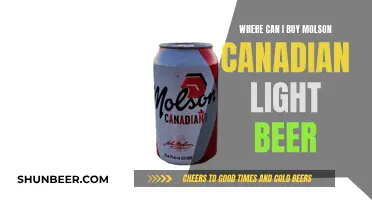
Buying a beer distributor is a great business opportunity, especially if you have a passion for the product. However, due to the regulation of the alcohol industry, it's important to understand what's involved. In the US, alcohol distribution and sales are regulated at both the state and federal level using a three-tier system. This means that brewers are not permitted to sell their product directly to retailers and must sell to distributors, who then move the product to retailers. Before you buy a beer distributor, you should be aware of the various requirements and licenses needed to operate legally. These include obtaining an Employee Identification Number (EIN) from the IRS, filling out permits with the United States Alcohol and Tobacco Tax and Trade Bureau (TTB), and obtaining state permits. You will also need to find a commercial property that is zoned for beer distribution and consider the necessary equipment and vehicles for the business.
| Characteristics | Values |
|---|---|
| First Steps | Decide on a business structure (e.g. sole proprietorship, partnership, corporation, S corporation, LLC). Consult tax and legal professionals. |
| Business Name | Apply for a Doing Business As (DBA) certificate from your state to reserve your company name. |
| Employee Identification Number (EIN) | Obtain an EIN from the Internal Revenue Service (IRS) by completing IRS Form SS-4. |
| Trademarking | Trademark your word mark or logo mark with the United States Patent and Trademark Office. |
| Business Plan | Create a solid business plan, including financial projections, marketing plan, market analysis, and competitor analysis. |
| Facility | Hire a commercial realtor or broker to help find a suitable warehouse facility with well-designed loading docks. Consider buying, leasing, or building. |
| Insurance | Insure your business property against theft, flooding, fire, and liability. Consider specific policies for natural disasters and an umbrella policy. |
| Equipment and Trucks | Purchase used equipment (e.g. forklifts, refrigeration) and trucks, or consider leasing options. Ensure trucks have a gross vehicle weight rating of under 26,000 pounds and "beverage bodies" for easy loading and unloading. |
| Federal Licensing | Obtain a federal permit for distributing beer by complying with the Federal Alcohol Administration Act. Complete the Application for Basic Permit (TTB Form 5100.24) on the U.S. Alcohol and Tobacco Tax and Trade Bureau (TTB) website. |
| State Licensing | Contact your state's Secretary of State Office or Attorney General's Office to obtain the necessary state distributor or wholesaler permits. Comply with any warehouse and zoning requirements. |
| Brewer and Retailer Relationships | Stay informed about beer trends, attend conferences, and subscribe to beer-related content. Network with brewers, breweries, and retailers to form partnerships and distribution solutions. |
What You'll Learn

Understand the three-tier alcohol distribution system
The three-tier alcohol distribution system was set up in the United States after the repeal of Prohibition in 1933. The three tiers are:
- Importers or producers: This tier includes brewers, winemakers, distillers, and importers. They manufacture the products and sell them to distributors, generally at a 50% price increase.
- Distributors or wholesalers: Distributors are the middlemen between the producers and retailers. They handle logistics such as storage, transportation, and marketing. They also have contacts and relationships with retailers, which can benefit the producers.
- Retailers: Retailers are the last tier before reaching consumers. They include licensed locations like bottle shops, liquor stores, restaurants, and bars. They are responsible for ensuring that alcoholic beverages are only sold to those of legal drinking age.
The three-tier system was created to prevent sole ownership across production, distribution, and retail, and to provide checks and balances. It also allows for the collection of taxes on alcohol by the state. The system varies from state to state, with some states having additional exceptions and regulations. For example, some states allow brewpubs, which are both producers and retailers, to operate without selling to a distributor.
Duff Beer: Can UK Fans Buy It?
You may want to see also

Get the required permits and licences
To operate a beer distribution company legally, you need permits at both the federal and state levels. Without the necessary legal permits, you could face fines and other criminal punishments. Here is a detailed, step-by-step guide on how to obtain the required permits and licences to buy a beer distributor:
Apply for a Doing Business As (DBA) Certificate:
Obtain a Doing Business As (DBA) certificate from your state to reserve the name of your beer distribution company. The specific state office handling DBA registration may vary, but it is typically the Secretary of State's Office. Complete the DBA registration form with your desired distribution company name, personal contact information, and Social Security number. The DBA fee typically ranges from $20 to $50, depending on your state.
Obtain an Employer Identification Number (EIN):
Acquire an Employer Identification Number (EIN) from the Internal Revenue Service (IRS). This number is essential for issuing W-2 forms to your employees at the end of the fiscal year, and your employees will need it for their tax filings. Obtaining an EIN is free of charge and can be done conveniently through the IRS website.
Complete the "Application for Basic Permit":
Visit the U.S. Tax and Trade Bureau website and fill out the "Application for Basic Permit" form. This permit is mandated by the Federal Alcohol Administration Act for any entity wishing to operate as a beer distributor. Provide your business name, EIN, personal contact information, and recent residences in the application. Additionally, under the "Business To Be Conducted at Premises Address" section, remember to check the "Distilled Spirits Plant" box and the "Processing" box. Send the completed form to the specified address.
Obtain State-Specific Permits:
Contact your state's Attorney General's Office or Secretary of State's Office to gather information about the necessary state-specific permits for operating a beer distribution business. Your state may have a dedicated department that oversees beer distributor licensing. For example, the Texas Alcohol and Beverage Commission is responsible for regulating and issuing permits to distributors within Texas. These permits can range in cost from a few hundred to a few thousand dollars and typically take a few weeks to process.
Sign a Lease for a Commercial Property:
Find a commercial property that is zoned for beer distribution and sign a lease. Consult with your county clerk to confirm that the property aligns with your zoning requirements. Additionally, be mindful of any state laws pertaining to the proximity of beer distribution businesses to places of worship or schools. Your county clerk can provide valuable insights into these special proximity laws.
Comply with the Bioterrorism Act:
In accordance with the Bioterrorism Act, remember to register any facility that will be holding food or beer with the Food and Drug Administration (FDA). Initiate the registration process by visiting the FDA website.
Understand State Licensing Requirements:
Each state may have unique licensing requirements for beer distributors. Familiarize yourself with the specific state licensing bodies and their respective processes.
Buying Beer in Minnesota: Sunday Shopping Laws Explained
You may want to see also

Find a suitable property
When it comes to finding a suitable property for your beer distribution business, there are several key factors to consider. Firstly, it is essential to ensure that the property is zoned for beer distribution. Contact your county clerk to verify that the property you choose falls within the designated zoning regulations for beer distribution. In addition, be mindful of any state laws pertaining to the proximity of beer distribution businesses to places of worship, schools, and other similar establishments. Your county clerk can provide valuable insights into these special proximity laws.
The size of the property should also be a key consideration. Opt for a space that can accommodate your operations, including storage, office space, and room for expansion if needed. Consider the volume of inventory you plan to store and the number of employees who will be working at the facility. Ensure that the property has adequate loading docks or drive-in doors to facilitate seamless deliveries and shipping.
Another critical aspect is the availability of essential utilities. Assess the capacity of the water, sewer, electric, and gas supply lines servicing the property. Breweries tend to be heavy users of these utilities, and upgrading them can be costly. Therefore, opt for a property with sufficient utility infrastructure to meet your needs.
When evaluating potential properties, consider the surrounding area and its impact on your business. For instance, if you plan to have a taproom, ensure that there is ample parking available for customers. Additionally, take into account any local zoning regulations that may apply. While breweries are typically permitted in industrially-zoned districts, some cities are relaxing these restrictions. Nevertheless, it is prudent to consult with the local zoning or planning office to confirm that your chosen location aligns with the relevant zoning regulations.
Lastly, consider the landlord's attitude towards leasing the property for a brewery. Some landlords may have reservations about leasing to breweries, especially if they include taprooms due to potential liability concerns. Seek out landlords who are enthusiastic about having a brewery as a tenant and are willing to work collaboratively with you.
Where to Find Don't Poke the Bear Beer
You may want to see also

Insure your business
As a beer distributor, you will need to obtain various licenses and permits to operate legally. In addition to federal and state licenses, you will also need insurance to protect your business and comply with vendor contracts. Here are some key considerations for insuring your beer distribution business:
- General Liability Insurance: This is the most requested form of insurance in vendor contracts. It covers bodily injury and property damage to third parties due to negligence associated with your premises, operations, products, or completed operations. It also includes personal injury, libel, slander, and advertising injury coverage.
- Product Liability Insurance: While general liability insurance often includes product liability, separate product liability insurance may be more suitable for some businesses. This type of insurance protects your business from financial loss if your product causes injury or damage.
- Commercial Umbrella or Excess Liability Insurance: This type of insurance can increase your liability limits when needed. It can be added to your primary liability policy or purchased as a separate policy, depending on the requirements.
- Other Insurance Coverage: Don't forget about other important coverage types, such as inventory at specific locations, product sold in foreign countries, product recall or contamination, and workers' compensation.
- Compliance with Vendor Contracts: When securing general liability or product liability insurance, ensure you understand the limits of liability per occurrence and in aggregate. Comply with any endorsements or changes requested by vendors, such as adding an additional insured or a waiver of subrogation.
- Insurance for Specific Beverage Types: Depending on the type of beverages you distribute, you may need specialized insurance. For example, if you distribute alcoholic beverages, energy drinks, or functional beverages, there may be unique risks and regulations to consider.
- Insurance for Business Operations: In addition to insuring your products, consider insurance for other aspects of your business, such as hired and non-owned auto liability, inventory/packaging property coverage, and business income coverage.
- Understanding Policy Details: Pay close attention to the details of your insurance policy, including deductibles, additional insured provisions, defense costs, coverage territories, and exclusions (e.g., virus and bacteria exclusions).
- Policy Audits and Cancellations: Be aware that your insurance policy will likely be audited annually, and premiums may be adjusted based on actual sales. Understand the process and potential penalties if you need to cancel your policy during the policy term.
- Occurrence or Claims-Made Policies: Know the difference between occurrence and claims-made policies. Occurrence policies cover incidents that occur during the policy period, even if the claim is filed later. Claims-made policies cover incidents only if the claim is made during the policy period.
Best Places to Buy Red Dog Beer
You may want to see also

Source equipment and vehicles
As a beer distributor, you will need to source equipment and vehicles to store and transport beer.
Firstly, you will need to find a facility to store your beer. This is typically a warehouse with well-designed loading docks and refrigeration cases. You can either buy, lease, or build such a facility. Leasing is often the best option for new businesses, but you may also be able to obtain a lease-to-buy option.
Next, you will need to source equipment for your facility. This includes refrigeration, beverage racking, and pallet racking. Most other equipment, such as forklifts, can be purchased second-hand.
Finally, you will need to source vehicles to transport your beer. It is recommended to start by leasing trucks, as this can cut down on overhead costs. Look for trucks with a gross vehicle weight rating of under 26,000 pounds, which can carry at least 2,000 pounds (around 100 cases) of beer. Aim for trucks with "beverage bodies" for easy loading and unloading, and diesel or hybrid engines to reduce fuel costs.
Thanksgiving Beer Run: What's Open and What's Not?
You may want to see also
Frequently asked questions
The first step is to obtain an Employee Identification Number (EIN) from the IRS. This is done by completing IRS Form SS-4.
The second step is to start filling out permits with the United States Alcohol and Tobacco Tax and Trade Bureau (TTB). The primary form that needs to be filled out is TTB Form 5100.24, also known as the Application for Basic Permit under the Federal Alcohol Administration Act.
The third step is to obtain the state permits necessary to operate a beer distribution business. Contact your state's Attorney General's Office or Secretary of State's Office for more information.
The fourth step is to sign a lease at a commercial property zoned for beer distribution. Once you find a property in your price range, contact your county clerk to verify that it is zoned for your needs.







